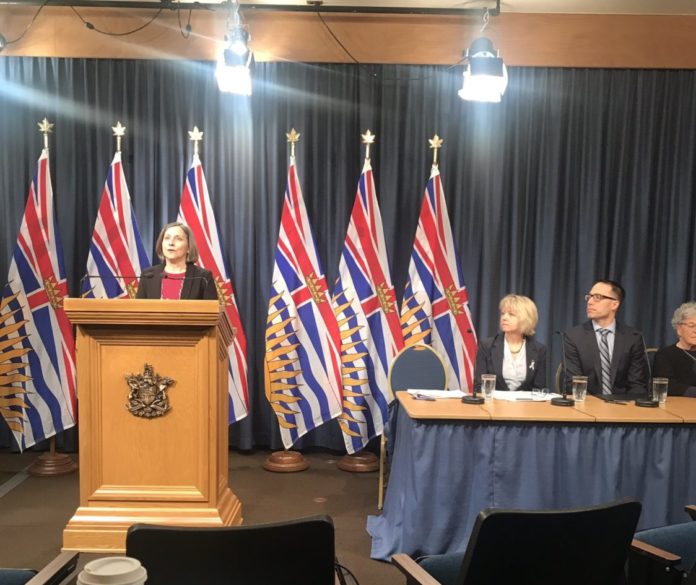BC Coroners Service and the Office of the Provincial Health Officer are calling for more research to be dedicated to drug overdose prevention as overdoses continued to climb in 2018, despite “significant efforts” from groups throughout the province.
According to a Thursday morning news conference, 1,489 suspected illicit drug overdose deaths occurred in 2018, a slight increase from the number of related deaths in 2017. Of these nearly 1,500 deaths, the Coroners Service identified alarming patterns in the age and demographics of the victims.
Nearly 50% of all who died of illicit drug overdose were employed men, and 45% were people who suffered from pain-related issues while other ages and demographics were over represented.
In relation to pain-related drug overdose: opioids are helpful post-surgery and for people with cancer pain, but the problem is overprescribing opioids particularly for chronic non-cancer pain. Education in the health industry is vital, says Dr. Bonnie Henry
— Brishti Basu (@brish_ti) February 7, 2019
Moreover, the number of overdose deaths in the province exceeds the number of vehicle collision fatalities, homicides, and suicides combined.
“This latest report confirms what those on the frontline already know all too well: this crisis is not slowing down,” said Dr. Evan Wood, executive director with the BC Centre on Substance Use.
Meanwhile, Victoria ranked the third highest in number of overdose deaths in the province, just after Vancouver and Surrey. In total, there were 94 illicit drug overdose deaths in the city in 2018.
A “compassionate, non-judgemental, resource-based response” is necessary to combat this crisis, said Lisa Lapointe, chief coroner of BC Coroners Service at a news conference on Thursday.
Toxic drugs
According to health officials, almost all synthetic drugs on BC streets right now contain some form of fentanyl.
The dangerous substance was responsible for nearly 80% of all illicit drug overdose deaths from 2016 – 2018.
Almost all synthetic drugs on the streets in BC right now includes some form of fentanyl, according to Dr. Henry
— Brishti Basu (@brish_ti) February 7, 2019
BC needs a plan
Provincial health officials are calling for big changes to the treatment of illicit substances both at a policy level and at a societal one.
“If we’re going to turn the corner on this complex crisis, we need to find the ways to provide safer alternatives to the unregulated and highly-toxic drug supply and to end the stigma associated with criminalization of people who use drugs,” said Dr. Bonnie Henry, provincial health officer.
Authorities believe that the criminal prohibition of some illicit drugs stigmatizes users, preventing people from getting the help or information they need. Meanwhile the province believes that more significant efforts need to be made in the areas of addiction support, prevention, treatment, and training.
“We have made some progress by implementing harm reduction measures. Many more people would be dead if not for supervised consumption sites and naloxone,” said Wood. In 2018 there were no reported deaths at supervised consumption or overdose prevention sites.
Dr. Evan Wood of @BCCSU, "we need a provincial strategy to address the substance use challenges ahead of us". Expresses the need of a safe way to look at toxic street drugs that have arisen as a result of prohibition. Advocates regulated opioids #yyj #bcpoli pic.twitter.com/feqihnZNyJ
— Brishti Basu (@brish_ti) February 7, 2019
While health authorities in the province have spoken at length about the need for a plan, no new concrete framework has been developed yet.
Provincial Health Officer Dr. Bonnie Henry pointed to some addiction prevention models like Portugal’s – where many illicit drugs were decriminalized – as strategies that BC could follow, however the challenge lies in fitting new measures into the existing public safety constructs in the province.
Provincial Health Officer Bonnie Henry on solutions: "We're certainly looking at the model in Portugal, but it needs to fit within the regulatory framework in Canada and within the public safety constructs in BC." No further details on what this will look like in BC at this time.
— Brishti Basu (@brish_ti) February 7, 2019
While the province has important data, officials are looking for more before developing a regulated opioid service.
“As this emergency continues, we need options to provide people at risk of overdose with low-barrier access to a regulated supply of opioids, and we need to connect people who use drugs with the supports they need rather than sending them to the criminal justice system,” said Henry.



